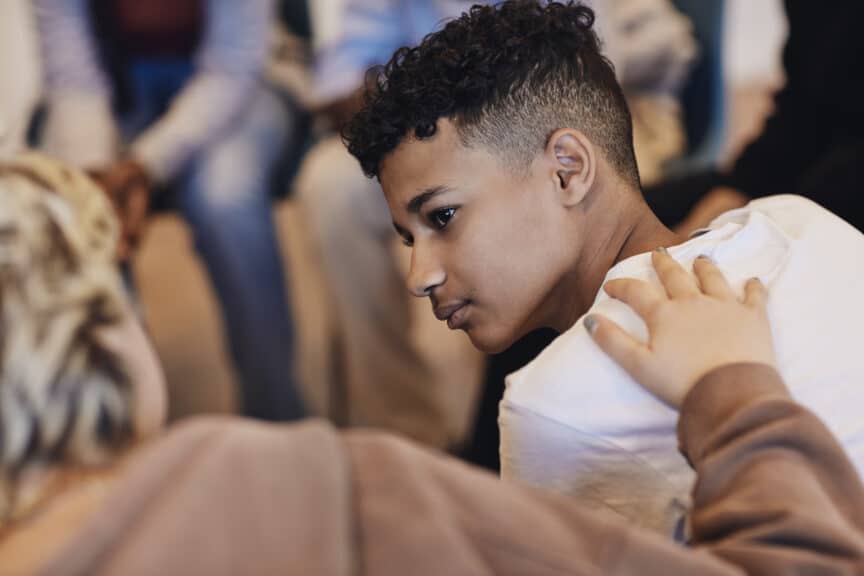In all reality, tragedy is taking place all around us. And because of our ability to instantly communicate today, we see and hear about it more and more.
Inevitably, children are often affected by tragedy, whether directly or indirectly.
As it’s hard to watch, process, and deal with difficult events as an adult, the same is true of our children. And it feels like it gets more difficult day by day to shield them from these types of events.
Because of this, we need to be proactive in helping them process their thoughts and emotions.
But how? As we help kids through these types of events or experiences, it’s important we do so in age-appropriate ways. Here are some ideas for you to think through.
As it’s hard to watch, process, and deal with difficult events as an adult, the same is true of our children.
8 Ideas for Helping Kids Through Tragedy
1. Let Kids Be Kids
Children are still learning to manage emotions in general, let alone in regard to tragic news. They may express anger, sadness, or any number of other emotions. That’s okay.
Give them the space they need to respond and express their feelings.
2. Be Real, But Not Overly Emotional
It’s really unsettling for children when they see adults expressing extreme emotions. While it’s okay for them to see you upset—especially in the middle of tragedy—it’s important we don’t lose control of ourselves in front of children.
While we want to be real with our kids, we don’t want to frighten them into thinking they won’t be okay. If we’re honest with ourselves, at times it won’t be okay. And it’s important that we don’t cause our kids to live in fear as we process.
Remember—they are looking to you as the model for how to respond.

Watch this Webinar: Supporting Families in an Anxious World: Professional Guidance for Children’s Ministry Leaders
3. Be Honest, Not Graphic
Kids will look to you for answers, but let’s face it, answers are sometimes hard to come by. It’s okay to tell them that.
When you can answer, respond and let them know as much information as you can, while also protecting them from what you can. They don’t need to know all of the details.
4. Point Them to God
You see, tragedy is not what God intended for us. But the why question will be attached to every tragedy. Teach them that God wants us to bring our questions to Him; He’s big enough to handle them. And remind them that while we may never have the answer, we can trust and rely on God who is good and Holy.
As you do this, continually assure them of God’s love for them and for all those involved in the tragedy.
Give kids the space they need to respond and express their feelings.
5. Pray Together
One of the most settling practices we can do is simply to pray with our kids. We can pray for our children and for those effected by the trauma or tragedy we are processing together.
Pray with them for the victims, those who are affected, and those who are responding. It’s so good to build up the practice of prayer, especially with another’s wellbeing in mind.
It’s a great habit for them to begin, but what’s better is that they begin to trust that the God who loves all of us can and will do something.

6. Look to Help
You might have a regular prayer time for the situation and those involved. But you may also be able to get actionable by donating essentials, money, time, or something else to help those in need.
Let kids be part of the process as much as possible.
7. Limit Exposure
It is simply part of life that our kids are going to hear about major tragedies and experience trauma in their own lives. But allowing them to be exposed to endless hours of coverage, or constantly talking about it in their presence, just isn’t healthy for them.
They need to have some sense of normalcy in their routine and day to day. We don’t want our kids growing up feeling uneasy or unstable in their environments.
One of the most settling practices we can do is simply to pray with our kids.
8. Keep an Eye on Them
Just because you had a good talk with your child or children initially, it doesn’t mean that all will be well from that point forward. Always be sure to keep an eye on them and proactively manage any changes in emotion, behavior, or daily routine.
Additional Articles and Helpful Resources
- Hard Questions and Answers from God’s Word
- Techniques for Supporting Anxious Kids: Sometimes the Only Way Is Through
- Practical Ways to Navigate a Hyper-Anxious World: Introduction (Part 1)
- Practical Ways to Navigate a Hyper-Anxious World: What Causes Anxiety (Part 2)
- Practical Ways to Navigate a Hyper-Anxious World: A Matter of the Brain (Part 3)
- Practical Ways to Navigate a Hyper-Anxious World: Tools to Help (Part 4)
- Practical Ways to Navigate a Hyper-Anxious World: Restoring Power (Part 5)
- Practical Ways to Navigate a Hyper-Anxious World: Conclusion (Part 6)











